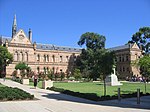Robin Warren
Robin Warren | |
|---|---|
 Robin Warren in 2009 | |
| Born | John Robin Warren 11 June 1937 |
| Nationality | Australian |
| Education | St Peter's College, Adelaide |
| Alma mater | University of Adelaide |
| Known for | Discovery ofHelicobacter pylori |
| Awards | Paul Ehrlich and Ludwig Darmstaedter Prize(1997) Nobel Prize in Physiology or Medicine(2005) |
| Scientific career | |
| Fields | Pathologist |
| Institutions | Royal Perth Hospital |
John Robin WarrenAC(born 11 June 1937, inAdelaide) is an Australianpathologist,NobelLaureate and researcher who is credited with the 1979 re-discovery of thebacteriumHelicobacter pylori,together withBarry Marshall.[1]The duo proved to the medical community that the bacteriumHelicobacter pylori (H. pylori)[1]is the cause of mostpeptic ulcers.[1]
Early life and education[edit]
Warren received hisM.B.B.S.degree from theUniversity of Adelaide,having completed his high school education atSt Peter's College, Adelaide.
Career[edit]
Warren trained at theRoyal Adelaide Hospitaland became Registrar in Clinical Pathology at theInstitute of Medical and Veterinary Science(IMVS), where he worked in laboratory haematology which generated his interest in pathology.
In 1963, Warren was appointed Honorary Clinical Assistant in Pathology and Honorary Registrar in Haematology at Royal Adelaide Hospital. Subsequently, he lectured in pathology at Adelaide University, then took up the position of Clinical Pathology Registrar at the Royal Melbourne Hospital. In 1967, Warren was elected to theRoyal College of Pathologists of Australasiaand became a senior pathologist at theRoyal Perth Hospitalwhere he spent the majority of his career.
Nobel Prize work[edit]
At theUniversity of Western Australia,with his colleagueBarry J. Marshall,Warren proved that the bacterium is the infectious cause ofstomach ulcers.[2]Warren helped develop a convenient diagnostic test (14
C-urea breath-test) for detectingH. pyloriin ulcer patients.[3]
In 2005, Warren and Marshall were awarded theNobel Prize in Medicine.
An Australian documentary was made in 2006 about Warren and Marshall's road to the Nobel Prize, called "The Winner's Guide to the Nobel Prize". He was appointed aCompanion of the Order of Australiain 2007.[4]
Asteroid254863 Robinwarren,discovered by Italian amateur astronomerSilvano Casulliin 2005, was named in his honour.[5]The officialnaming citationwas published by theMinor Planet Centeron 22 April 2016 (M.P.C.99893).[6]
Personal life[edit]
Warren married Winifred Theresa Warren (née Williams) in the early 1960s and together they had five children.[7]Winifred Warren went on to become an accomplished psychiatrist. Following her death in 1997, Warren retired from medicine.[7]
See also[edit]
References[edit]
- ^abc"Press Release: The Nobel Prize in Physiology or Medicine 2005".Nobelprize.org.Retrieved24 March2018.
- ^Marshall BJ, Warren JR (June 1984)."Unidentified curved bacilli in the stomach of patients with gastritis and peptic ulceration".Lancet.323(8390): 1311–5.doi:10.1016/S0140-6736(84)91816-6.PMID6145023.S2CID10066001.
- ^Surveyor I, Goodwin CS, Mullan BP, Geelhoed E, Warren JR, Murray RN, Waters TE, Sanderson CR (1989). "The14
C-urea breath-test for the detection of gastricCampylobacter pyloriinfection ".Med J Aust.151(8): 435–9.doi:10.5694/j.1326-5377.1989.tb101252.x.PMID2593958.S2CID40191259. - ^It's an Honour— Companion of the Order of Australia
- ^"254863 Robinwarren (2005 SM4)".Minor Planet Center.Retrieved3 September2019.
- ^"MPC/MPO/MPS Archive".Minor Planet Center.Retrieved3 September2019.
- ^abJ. Robin Warrenon Nobelprize.org,accessed 11 October 2020
External links[edit]
- Robin Warrenon Nobelprize.orgincluding the Nobel LectureHelicobacter - The Ease and Difficulty of a New Discovery
- Robin Warrens homepage
- 1937 births
- Living people
- Australian Nobel laureates
- Australian pathologists
- Companions of the Order of Australia
- Fellows of the Australian Academy of Science
- Nobel laureates in Physiology or Medicine
- People educated at St Peter's College, Adelaide
- People from Adelaide
- University of Adelaide Medical School alumni
- University of Western Australia alumni
- Academic staff of the University of Western Australia

